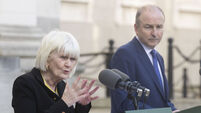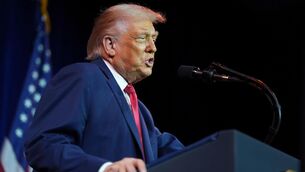US democracy is going the way of ancient Rome

US President Donald Trump speaks in the Oval Office at the White House last week about his plans for the 'Golden Dome', a national ballistic and cruise missile defense system. Picture: Chip Somodevilla/Getty Images
Are you as disturbed as I am watching democracy crumble from across the Atlantic?
So intense are the ties between Ireland and the US, it is akin to witnessing an American relative's slow surrender to dementia through sporadic FaceTime calls - you notice the deterioration in alarming leaps rather than a gradual decline. Four months into Donald Trump's second presidency, America's democratic institutions aren't so much bending as performing elaborate contortions to accommodate their ringmaster's whims.
In Saudi Arabia early this May, Trump delivered what his handlers grandly termed a "major address". The White House loves these labels - as if merely declaring something important makes it so. Much like calling a caravan of migrants an "invasion" or a Boeing aircraft a "gift". The speech itself was remarkable primarily for its brazen rejection of the promotion of American values abroad. No longer would America concern itself with trivial matters like human rights or democracy. No, Trump's America measures foreign relations purely through the cold mathematics of advantage.
"In recent years," Trump declared to his Saudi hosts, "far too many American presidents have been afflicted with the notion that it's our job to look into the souls of foreign leaders."
God alone, Trump insisted, should sit in judgment, his own divine assignment being merely to "defend America".
The Saudis, no doubt, welcomed this abdication of moral responsibility as enthusiastically as the publican greets their local team after a championship win. For a regime rather fond of dismembering journalists, having the leader of the free world essentially declare, "Who am I to judge?" must have provided considerable relief.
Yet in Qatar two days later, Trump's amoral facade cracked like cheap plaster. There, he gushed about that "very special place with a special royal family", promising American protection with all the emotional investment of JFK defending West Berlin. Qatar's demonstrated affection for Trump - in the form of a Boeing jet worth approximately $400 million - might explain this sudden warmth. One wonders what Ireland might need to gift to earn similar endearments. Perhaps the Book of Kells or Fungie the dolphin miraculously resurrected?
This is not, as some would have it, a value-neutral foreign policy. It's not amoral but immoral by design - rewarding autocracy, celebrating corruption, and elevating personal loyalty above all else. Trump doesn't avoid imposing a moral world order; he actively constructs an immoral one.
The Romans would recognise this pattern. Not the Republic's noble founding principles that American founders so admired, but its gradual, whimpering demise. Augustus, Rome's first emperor, didn't storm the Senate with a legion and declare himself dictator. He accumulated power incrementally, with the tacit blessing of senators too cowed, corrupt, or calculating to oppose him.
Trump similarly collects authority like a magpie gathering shiny objects, while Republican lawmakers perform Olympic-level mental gymnastics to justify their acquiescence. They watch, slack-jawed yet somehow nodding, as the Oval Office transforms into a family business. Nepotism isn't even trying to wear a disguise anymore. Critics find themselves suddenly jobless or investigated. Constitutional guardrails bend until they groan, and still, these elected representatives insist the Republic stands unblemished.
That business with Qatar and its flying tribute? Pure Augustus. Future historians won't need Latin to name this particular crossing of the Rubicon. What could better exemplify our new imperial reality than a foreign potentate's airborne offering? Former dictators received gold-plated toilet seats from sycophants; America's president now accepts $400 million aircraft from foreign states that host crucial US military installations. "Only a FOOL would not accept this gift on behalf of our Country," Trump wrote at 3am from Saudi Arabia, as if insomnia and caps lock constitute sound foreign policy.
His argument that the Boeing somehow serves as "temporary Air Force One" carries all the credibility of claiming that one's yacht is actually a maritime research vessel - technically possible but transparently absurd. Even loyal MAGA apostates like Laura Loomer have baulked at this particular communion wafer.
Yet to dismiss this as uniquely Trumpian overlooks how he merely amplifies existing elite failings. Qatar's generosity extends beyond aircraft, lavishing $115,000 monthly on now-Attorney General Pam Bondi's lobbying firm before her appointment. FBI Director Kash Patel similarly enjoyed Qatari remuneration prior to his current position. Donald Trump Jnr will soon enlighten attendees at the Qatar Economic Forum on the delicate art of "Monetising MAGA" - phrasing subsequently scrubbed from promotional materials with the embarrassed haste of a teenager deleting browser history.
This intermingling of personal profit and public office would deeply trouble America's founders, those perennial dinner guests at any discussion of democratic decay. They studied Roman history precisely to avoid its tragic conclusion - the transformation of a republic into an imperial dynasty. The checks and balances enshrined in the Constitution mirror those that existed in Rome before Augustus rendered them decorative.
What's particularly fascinating is how contemporary American elites have developed an infatuation with ancient Rome that borders on the erotic. Mark Zuckerberg swapped his 'Caesar' haircut for Marcus Aurelius curls. Elon Musk funds 'Greek-Roman culture' appreciation. Steve Bannon established a "gladiator school" near Rome itself. It's as if America's billionaire class is preparing their aesthetic sensibilities for the inevitable transition from Republic to empire.
Here in Ireland, we observe this democratic twilight with the uneasy recognition that America's democratic stability affects our own. We Irish know something about living in the shadow of empires. Our national memory carries the scars of dominion - the Famine's ghost, the Troubles' echo, the emigrant ships. This history breeds a certain instinct in us. When power concentrates in a single man's grasp, when institutions bend to personality rather than principle, when might tramples right – we recognise the stench. It's as familiar as turf smoke.
The current White House crew doesn't just pocket trinkets from despots; they've become apprentices to tyranny's craft. When Vance chides Europeans about excessive democratic safeguards, he speaks the language of every strongman who ever found free speech inconvenient.
The Roman Republic endured nearly 500 years before succumbing to Augustus. America's experiment with self-government has lasted just shy of 250. For half that time, Rome maintained the pretence of republicanism - the Senate continued meeting, elections were nominally held, and republican traditions were honoured in elaborate pageantry stripped of substance. But once a single man claimed the power to govern according to personal whim rather than constitutional constraint, the Republic existed in name only.
The American version of this transformation features modern trappings - Twitter pronouncements rather than carved edicts, television appearances instead of coin engravings - but follows a dismayingly familiar trajectory. Each norm violated without consequence, each institution compromised from within, and each corrupt bargain justified as temporary expedience brings the imperial presidency closer to permanent reality.
Perhaps this is why our fixation on America's democratic health borders on the obsessive. We're watching the slow-motion collapse of history's most powerful experiment in self-government, wondering if our own democracies might catch the contagion. The question isn't whether Trump resembles Augustus - he lacks the strategic patience and tactical brilliance - but whether America's democratic antibodies remain strong enough to resist the infection.
For now, we watch from across the Atlantic, nursing our pints and our anxieties in equal measure, hoping that America's democratic fever breaks before its republican experiment follows Rome's into the historical footnotes of failed governance. Democracy's fragility has never been more apparent, nor is its defence more urgent.





